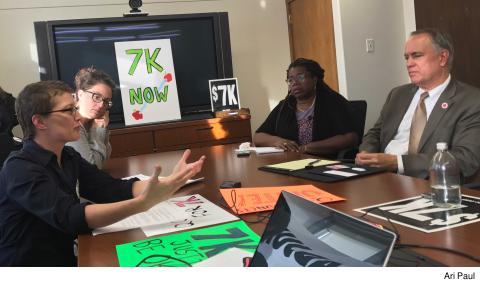Other actions take place around CUNY
 |
Queens College President Félix V. Matos Rodríguez listened attentively in a packed conference room on the eighth floor of an administration building, as more than a dozen part-time instructors and other activists told him why they were pushing for $7,000 per course for adjuncts.
Busking on the subway to make ends meet. Sharing one-bedroom apartments. Skipping meals. Contemplating quitting the profession altogether for higher-paid but less-skilled jobs. These were just some of the realities adjuncts wanted Matos Rodríguez, rumored to have been a finalist for the next CUNY chancellorship, to know about.
CAMPUS ORGANIZING
The meeting, which took place November 7 in a room hastily covered with $7K posters and banners, was the result of local adjunct organizing and a broader PSC campaign to deliver petitions to campus presidents about the necessity of $7K, raises for all and full funding for the contract. At Queens, the chapter was one of a few around the university that went a step further and demanded a face-to-face meeting with their boss, and got one.
“I felt like it was powerful,” said Jane Guskin, an adjunct instructor in urban studies who organized the meeting, remarking on the testimony PSC members delivered to the president. “I think he heard us, but we didn’t expect that this was going to be enough. It was more about making it clear that we’re organized and ready to escalate,” Guskin told Clarion.
This was one of several meetings adjuncts had with college presidents about the $7K demand – Brooklyn College, Lehman College and John Jay College had similar meetings between PSC adjuncts and campus presidents.
PRESSING PRESIDENTS
For his part, Matos Rodríguez said that he would look at the signed petitions including the $7K demand and relay the message to the interim chancellor, Vita Rabinowitz. He told the Queens College adjuncts that he cannot unilaterally up the pay for adjuncts, saying that this was a part of the ongoing bargaining between the PSC and the CUNY administration. He voiced hope that an increased budget for Queens College could result in more full-time faculty lines being offered for current adjuncts at the college.
And Matos Rodríguez noted that he could reach out to the college’s donor base and highlight the need for funding for faculty pay. But, he noted, the real fight was up to the union and what it could do in Albany to increase funding and to push for a fair contract with CUNY Central administration. In short, his message, like that of other presidents, was that the issue of pay was out of his control.
This response was similar to responses other college presidents gave to adjuncts. “Brooklyn College President Michelle Anderson said that her advocacy will be confined to discussions within the council of presidents, with the Board of Trustees and in her new role as a member of the Fiscal Affairs Committee,” Brooklyn College PSC Chapter Chair James Davis wrote in an email.
For the Queens chapter members in attendance, Matos Rodríguez offered encouragement, but it was not enough to materially change CUNY’s low pay for adjuncts – the union has made it clear to CUNY management in recent contract talks that CUNY part-time instructors, some paid as little as $3,100 per course, are paid significantly less than their peers at institutions like Rutgers.
“Mostly, what I heard were reasons he couldn’t do anything,” said Ben Chitty, a higher education associate at the college and a PSC delegate who attended the meeting.
And Anthony Malagon, an adjunct assistant professor of philosophy, had similar thoughts about the president’s response. “He was trying to wash his hands of it. It didn’t seem reassuring,” he said.
On the plus side, Malagon said he was inspired by the intensity of the local adjunct organizing for $7K at Queens College, where adjuncts rushed between classes to attend the meeting with the president to offer their personal experiences and to make clear that they were open to escalating tactics to realize their demand.
“I am surprised we picked up so much momentum this quickly,” Malagon said. “It’s encouraging.”
ADJUNCT REPRESENTATIVES
Many of the adjuncts said that they believed the low pay for adjuncts was hurting Queens College students. Some talked about how little time they were able to devote to student needs, or how they felt forced to consider other careers. Vadim Acosta, an adjunct lecturer in environmental science, recalled having to work as a gardener between days on campus in order to sustain his career in academia. “I had to find a real job in order to do my hobby of teaching, but it’s not a hobby,” he told the president.
In response, Matos Rodríguez vowed to make clear to the interim chancellor about the pedagogical concerns adjuncts had about low pay at CUNY.
As for next steps, Guskin said the chapter will develop at least one, preferably two, adjunct representatives in each department on campus to help intensify adjunct organizing in the future.
Marisa Holmes, who teaches in the urban studies program, added in regard to a department adjunct representative system, “It makes us all stronger. [The administration] can’t go after one person.”

